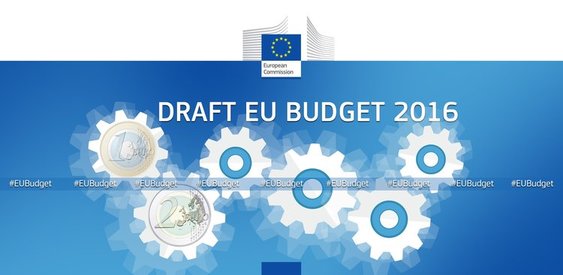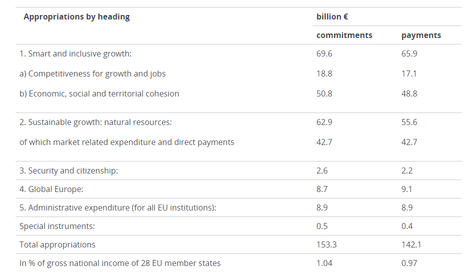EU's 2016 Budget : What is in for us?
Today the MEPs will vote on the EU budget for the next year. They reached an informal agreement with other member states earlier this month. This article will explore the key points and the priority areas of the budget.

The EU budget accounts for 1% of the GDP of the zone. Every parliamentary committee has its say and every MEP will closely scrutinize the contents of the budget. European Commissions’ initial draft budget will most likely be negotiated in the parliament and the end result will most often be a compromise between the Parliament and the European Commission. The Parliament’s budget proposal will contain the priority points as proposed by the MEPs and the document is prepared by the parliamentary budget committee. During a plenary session the MEPs will vote on it.
The European Commissions’ budget proposal was released on May and straight away the parliament entered in to negotiations to add their own priorities in to the proposal. For the MEPs, the priorities were based on boosting the economic growth, tackling the migrant crisis and the crises in the periphery of the EU as well as to negotiate debts. The merge between these priorities and the European Commissions’ proposal will be voted on today.
The proposal contains €155 billion in commitments and €143.8 billion in payments. This leaves €2.3 billion margin to account for expenditure on unforeseen needs. In the original proposal of the European Council the commitment budget was set to €153.27 billion and payments at €142.12 billion which they thought would help to reach the policy objectives for 2016. These margins were eventually negotiated with the parliament to arrive at the final figure and it will be interesting to observe the impact of the changes towards achieving policy objectives in the next year.
A summary of the Council’s position:

Also in the initial proposal Council proposed few priority areas including; boosting economy, managing the migrant flow and humanitarian aid as well as increasing funding for the Erasmus (European Student Exchange) program. Following the negotiations with the European Parliament, Pierre Gramegna-minister for finance of Luxembourg and President of the Council-stated that "The budget agreed today is a concrete expression of solidarity both within the EU and with third countries" … "It provides the EU with the financial means to boost growth, create jobs and tackle the migration crisis. And it keeps sufficient financial leeway to allow the EU to react to unforeseen needs and events."
On behalf of the Parliament, it was the Portuguese MEP José Manuel Fernandes who spoke about the results of the negotiations. He said that, "The budget for next year has to be a budget for jobs, competitiveness and solidarity: that is what Parliament has been fighting for. On the one hand, we ensured sufficient funding for the ongoing migration and refugee crisis, among others by reacting swiftly to the agreements reached at the summit in Valletta. On the other hand, we reinforced the EU research and development tool Horizon 2020, won extra funding for small and medium sized enterprises and the Erasmus+ student exchange programme and secured a commitment that the youth employment initiative will continue".
If the deal is approved today, Martin Schultz-president of the European Parliament-will have the power to sign the budget in to law.
Readers can find the draft documents of the budget here:
http://ec.europa.eu/budget/biblio/documents/2016/2016_en.cfm
Sources:
http://www.europarl.europa.eu/news/en/news-room/content/20151120STO03811/html/The-EU's-2016-budget-how-to-ensure-it-all-adds-up
http://www.europarl.europa.eu/news/en/news-room/content/20151030STO00793/html/Parliament-and-Council-reach-an-agreement-on-the-EU's-budget-for-2016
http://www.consilium.europa.eu/en/policies/eu-annual-budget/2016/